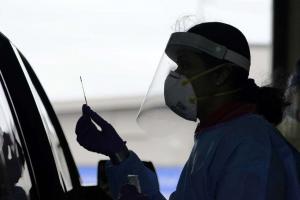
Point-of-care COVID Diagnostic Study
When the COVID-19 pandemic began, access to testing was a major challenge for our clinical laboratories and health systems across the country.
"Our research project has been focused on developing and evaluating rapid diagnostic tests called point of-care tests (POC tests) that can be used in community-based settings, and potentially increase reach in under-resourced areas and among vulnerable populations," said Drain.
"These tests are either PCR- or antigen-based, so they can be used to accelerate the diagnosis of acute COVID-19 infection."
 The UW’s Clinical Virology Lab acted quickly to develop and implement a highly accurate lab-based PCR test (polymerase chain reaction test, which detects the presence of an antigen). The City of Seattle then partnered with the UW’s Clinical Virology lab to expand access to testing throughout the community.
The UW’s Clinical Virology Lab acted quickly to develop and implement a highly accurate lab-based PCR test (polymerase chain reaction test, which detects the presence of an antigen). The City of Seattle then partnered with the UW’s Clinical Virology lab to expand access to testing throughout the community.
Despite these efforts, there are still challenges for implementing COVID testing, particularly in underresourced areas and among vulnerable populations.
While laboratory testing capacity has expanded to thousands of COVID tests per day, the testing output may still not be reaching adequate levels to stop transmission within the community.
In addition, nasal swabs have been in short supply, test turn-around times often last several days (and even weeks in some parts of the country), and most people find the nasopharyngeal testing (inserting a 6-inch long swab into the cavity between the nose and mouth) to be uncomfortable or painful.
Therefore, expediting and scaling up COVID-19 testing continues to be necessary in order to support the public health response to this pandemic.
Because SARS-CoV-2 is a new virus, new tests must be developed to detect it, and these POC tests must be evaluated to ensure that they are accurate, simple to use, and can be successfully implemented in clinic or community settings.
"In order to evaluate the diagnostic accuracy of these tests, our team is conducting POC testing and comparing the POC test results to results from laboratory testing, which is considered to be the gold standard for accurate and reliable COVID-19 test results," said Drain.
"Our team recruits participants at testing sites in Seattle, including the Aurora and Rainer Beach testing sites administered by the City of Seattle. These drive-through and walk-up testing sites are performing hundreds of COVID-19 tests each day, and clinical staff at each site collect nasal swabs that are sent out for laboratory testing."
A collaboration between the University of Washington and the City of Seattle, and generously funded by the Bill & Melinda Gates Foundation, the POC COVID Diagnostic Study is currently operating both at UW and City of Seattle COVID testing sites. They started enrolling participants in April 2019 and will continue enrollment until the Spring of 2021. They expect the full results to available at the end of 2021, while more critical and timely results will be presented during the course of the study.